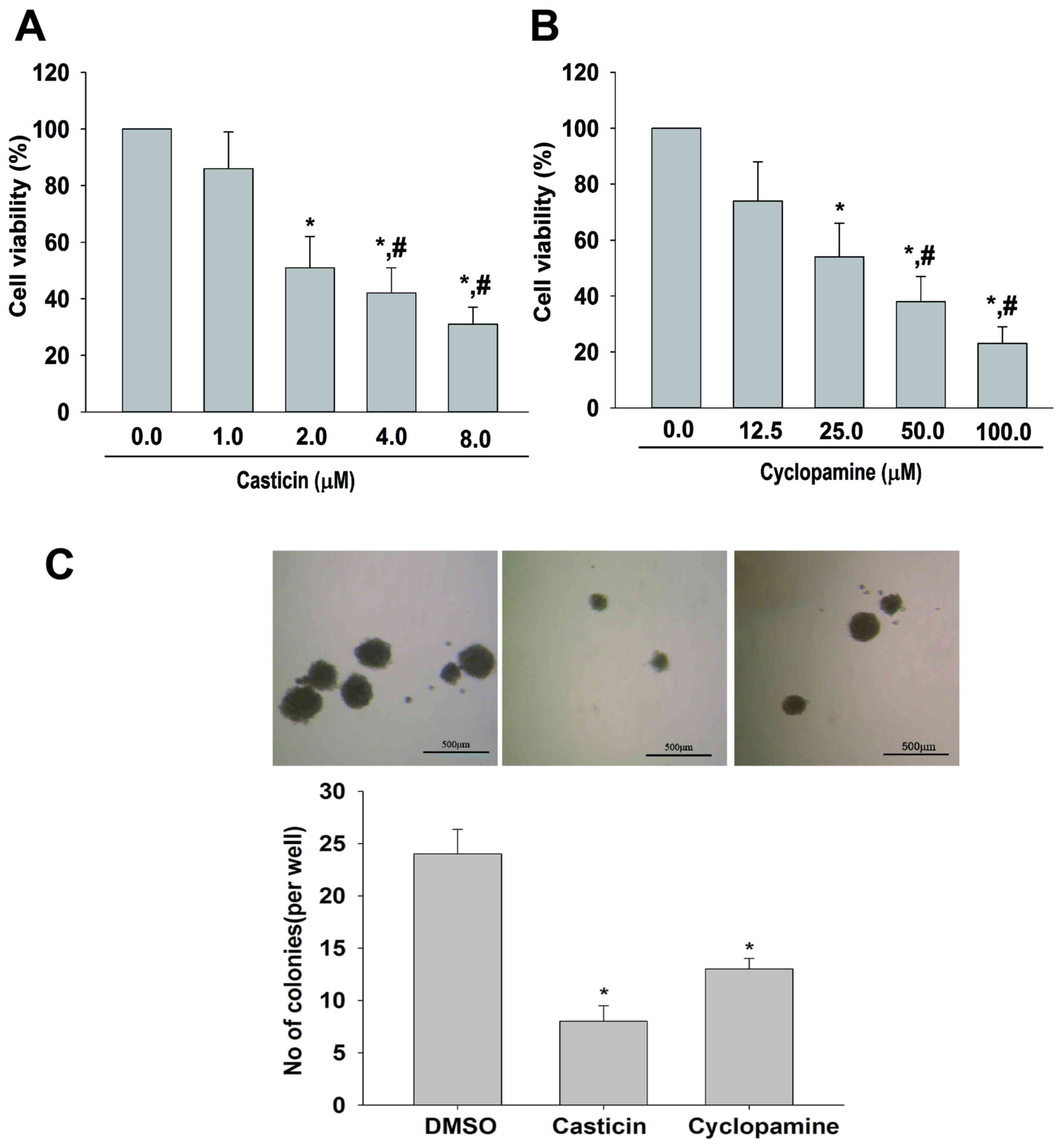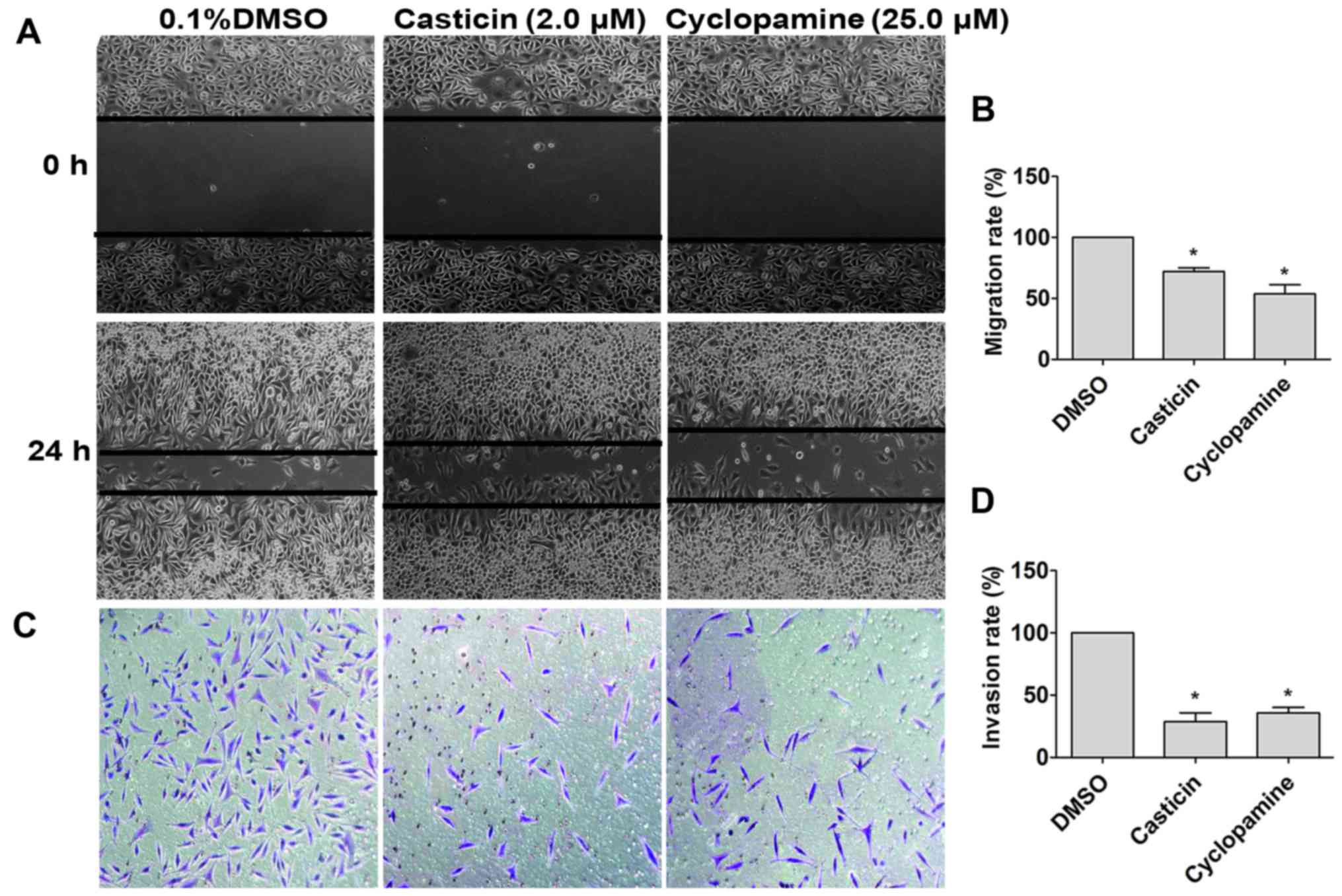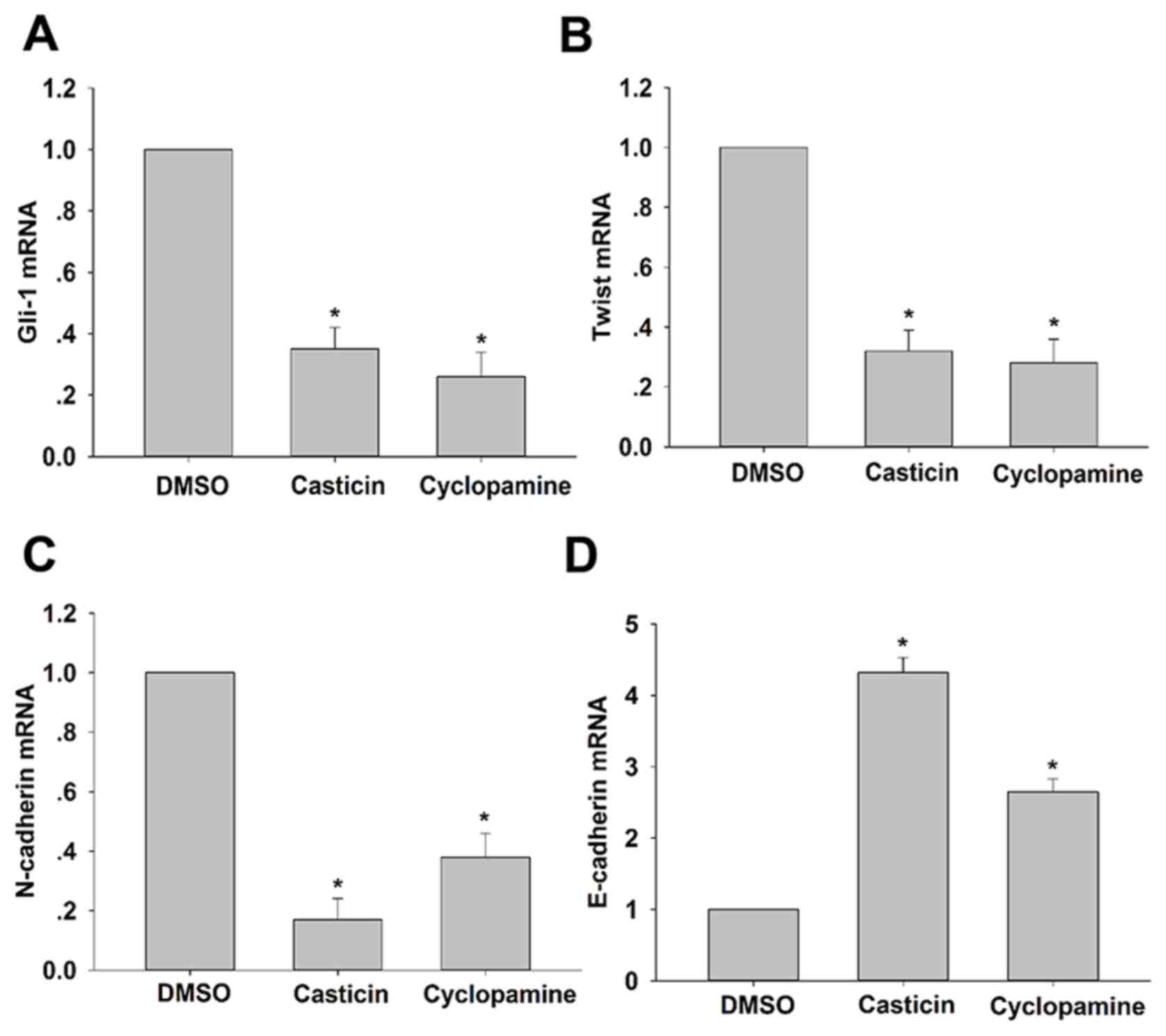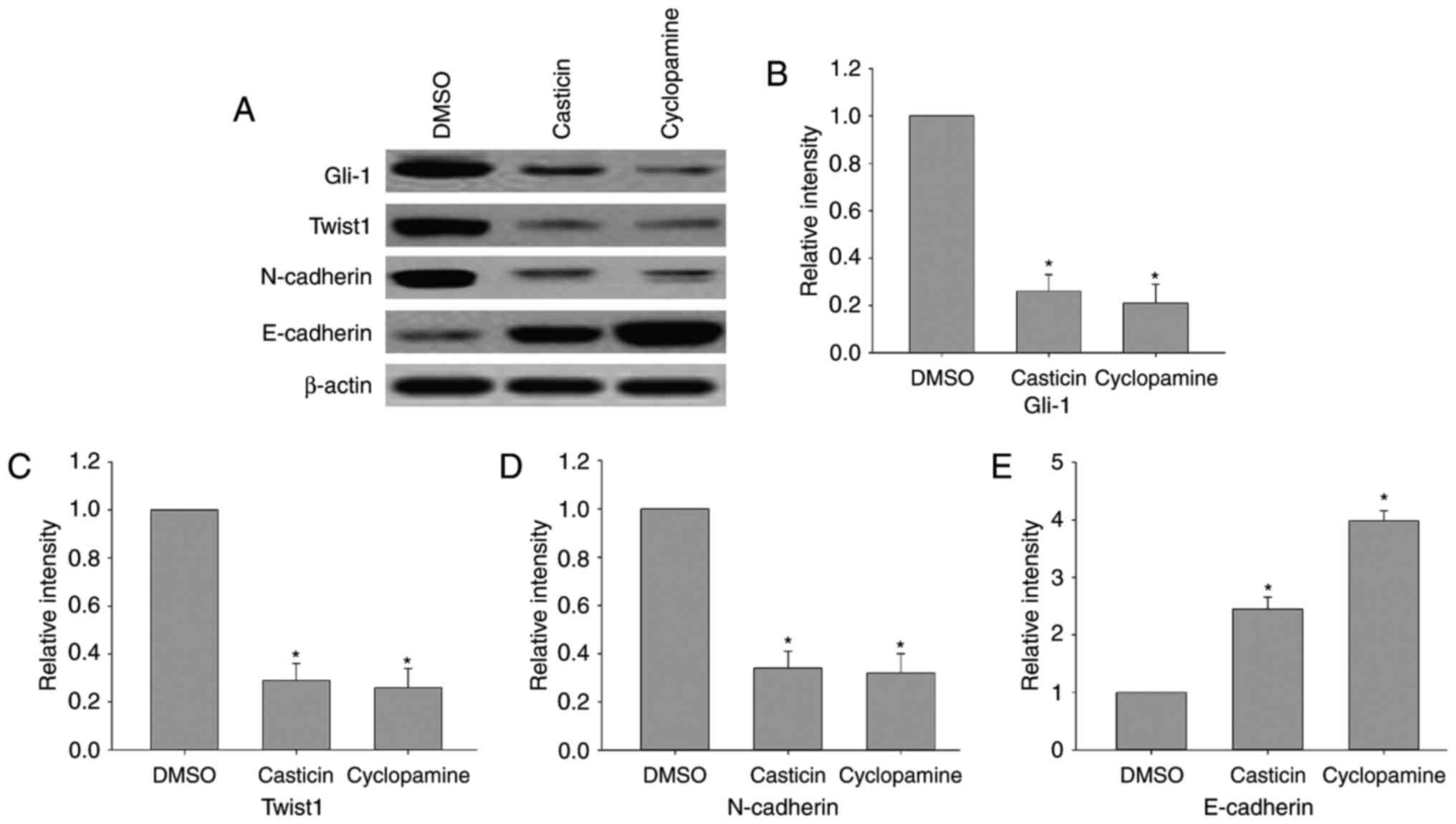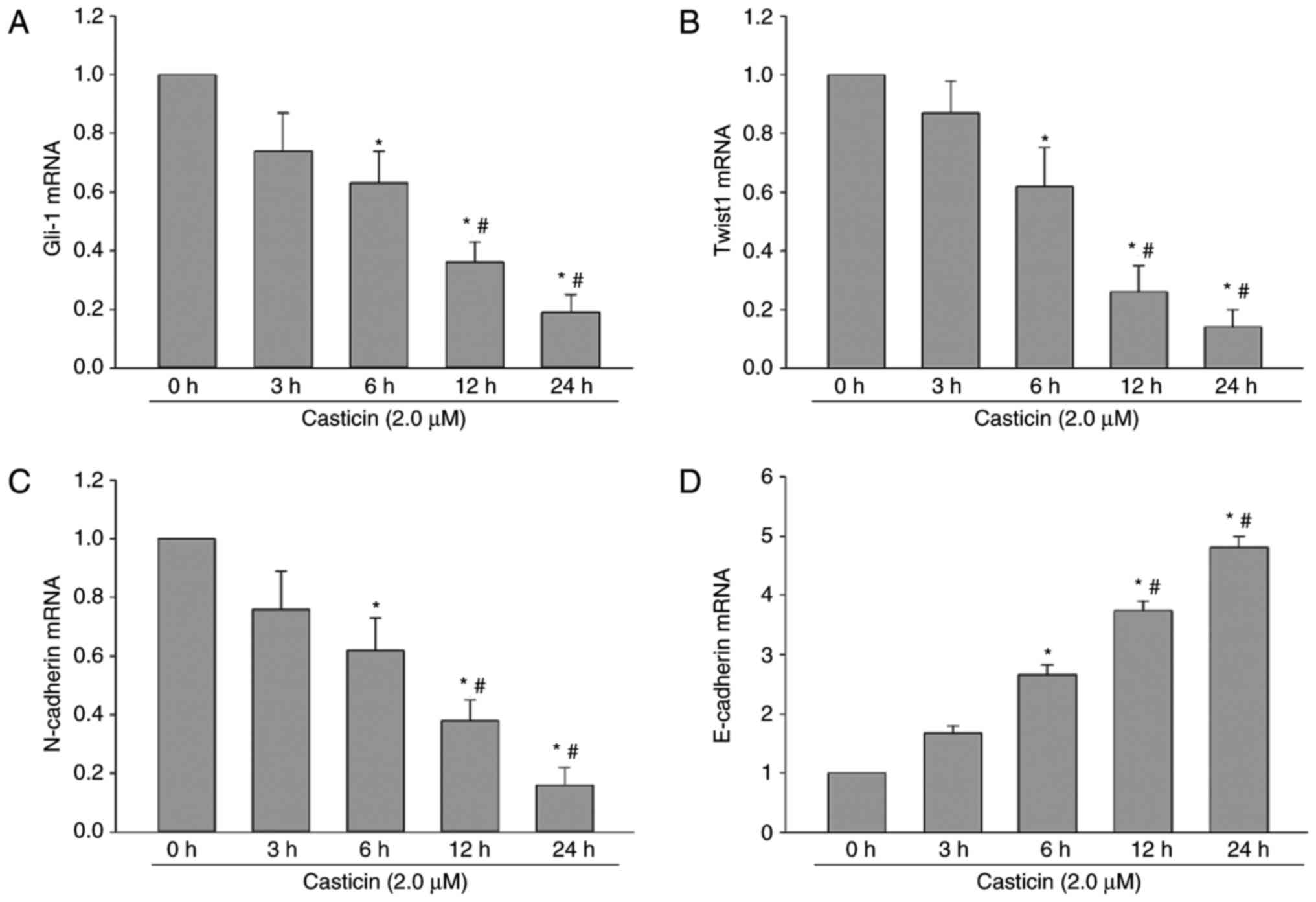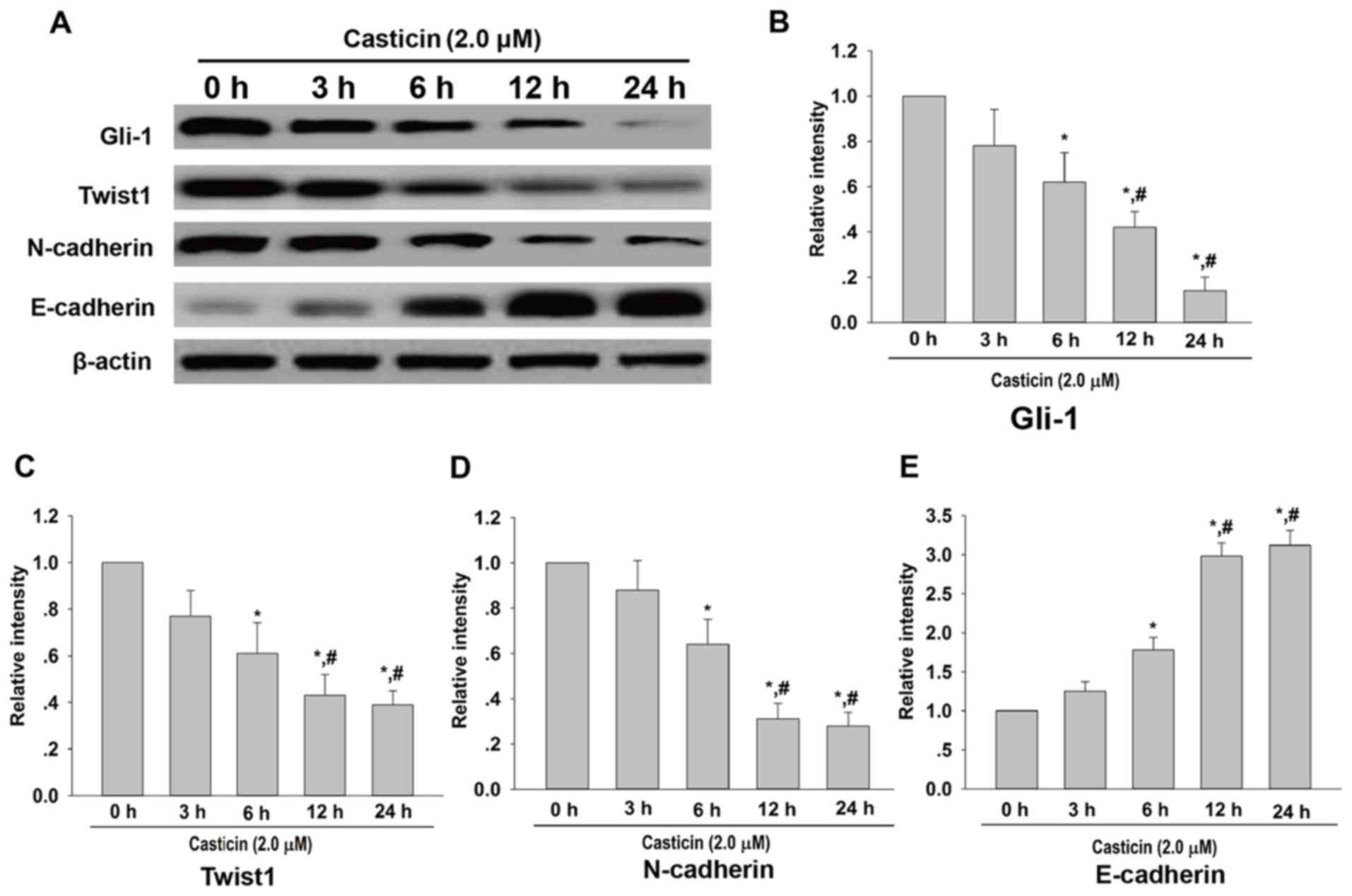|
1
|
Hunn J and Rodriguez GC: Ovarian cancer:
Etiology, risk factors, and epidemiology. Clin Obstet Gynecol.
55:3–23. 2012. View Article : Google Scholar : PubMed/NCBI
|
|
2
|
Chari ST, Yadav D, Smyrk TC, DiMagno EP,
Miller LJ, Raimondo M, Clain JE, Norton IA, Pearson RK, Petersen
BT, et al: Study of recurrence after surgical resection of
intraductal papillary mucinous neoplasm of the pancreas.
Gastroenterology. 123:1500–1507. 2002. View Article : Google Scholar : PubMed/NCBI
|
|
3
|
Lim SB, Yu CS, Jang SJ, Kim TW, Kim JH and
Kim JC: Prognostic significance of lymphovascular invasion in
sporadic colorectal cancer. Dis Colon Rectum. 53:377–384. 2010.
View Article : Google Scholar : PubMed/NCBI
|
|
4
|
Radisky DC: Epithelial-mesenchymal
transition. J Cell Sci. 118:4325–4326. 2005. View Article : Google Scholar : PubMed/NCBI
|
|
5
|
Kalluri R and Weinberg RA: The basics of
epithelial-mesenchymal transition. J Clin Invest. 119:1420–1428.
2009. View
Article : Google Scholar : PubMed/NCBI
|
|
6
|
Hotz HG, Hotz B and Buhr HJ: Genes
associated with epithelial-mesenchymal transition: Possible
therapeutic targets in ductal pancreatic adenocarcinoma? Anticancer
Agents Med Chem. 11:448–454. 2011. View Article : Google Scholar : PubMed/NCBI
|
|
7
|
Mell LK, Meyer JJ, Tretiakova M, Khramtsov
A, Gong C, Yamada SD, Montag AG and Mundt AJ: Prognostic
significance of E-cadherin protein expression in pathological stage
I–III endometrial cancer. Clin Cancer Res. 10:5546–5553. 2004.
View Article : Google Scholar : PubMed/NCBI
|
|
8
|
Sun XD, Liu XE and Huang DS: Curcumin
reverses the epithelial-mesenchymal transition of pancreatic cancer
cells by inhibiting the Hedgehog signaling pathway. Oncol Rep.
29:2401–2407. 2013. View Article : Google Scholar : PubMed/NCBI
|
|
9
|
Lei J, Ma J, Ma Q, Li X, Liu H, Xu Q, Duan
W, Sun Q, Xu J, Wu Z and Wu E: Hedgehog signaling regulates hypoxia
induced epithelial to mesenchymal transition and invasion in
pancreatic cancer cells via a ligand-independent manner. Mol
Cancer. 12:662013. View Article : Google Scholar : PubMed/NCBI
|
|
10
|
Brechbiel J, Miller-Moslin K and Adjei AA:
Crosstalk between hedgehog and other signaling pathways as a basis
for combination therapies in cancer. Cancer Treat Rev. 40:750–759.
2014. View Article : Google Scholar : PubMed/NCBI
|
|
11
|
Feldmann G, Fendrich V, McGovern K, Bedja
D, Bisht S, Alvarez H, Koorstra JB, Habbe N, Karikari C, Mullendore
M, et al: An orally bioavailable small-molecule inhibitor of
Hedgehog signaling inhibits tumor initiation and metastasis in
pancreatic cancer. Mol Cancer Ther. 7:2725–2735. 2008. View Article : Google Scholar : PubMed/NCBI
|
|
12
|
Bao C, Namgung H, Lee J, Park HC, Ko J,
Moon H, Ko HW and Lee HJ: Daidzein suppresses tumor necrosis
factor-α induced migration and invasion by inhibiting hedgehog/Gli1
signaling in human breast cancer cells. J Agric Food Chem.
62:3759–3767. 2014. View Article : Google Scholar : PubMed/NCBI
|
|
13
|
Takebe N, Harris PJ, Warren RQ and Ivy SP:
Targeting cancer stem cells by inhibiting Wnt, Notch, and Hedgehog
pathways. Nat Rev Clin Oncol. 8:97–106. 2011. View Article : Google Scholar : PubMed/NCBI
|
|
14
|
Kim EJ, Sahai V, Abel EV, Griffith KA,
Greenson JK, Takebe N, Khan GN, Blau JL, Craig R, Balis UG, et al:
Pilot clinical trial of hedgehog pathway inhibitor GDC-0449
(vismodegib) in combination with gemcitabine in patients with
metastatic pancreatic adenocarcinoma. Clin Cancer Res.
20:5937–5945. 2014. View Article : Google Scholar : PubMed/NCBI
|
|
15
|
Wang F, Ma L, Zhang Z, Liu X, Gao H,
Zhuang Y, Yang P, Kornmann M, Tian X and Yang Y: Hedgehog signaling
regulates Epithelial-mesenchymal transition in pancreatic cancer
Stem-like cells. J Cancer. 7:408–417. 2016. View Article : Google Scholar : PubMed/NCBI
|
|
16
|
Yue D, Li H, Che J, Zhang Y, Tseng HH, Jin
JQ, Luh TM, Giroux-Leprieur E, Mo M, Zheng Q, et al: Hedgehog/Gli
promotes epithelial-mesenchymal transition in lung squamous cell
carcinomas. J Exp Clin Cancer Res. 33:342014. View Article : Google Scholar : PubMed/NCBI
|
|
17
|
Kong Y, Peng Y, Liu Y, Xin H, Zhan X and
Tan W: Twist1 and Snail link Hedgehog signaling to tumor-initiating
cell-like properties and acquired chemoresistance independently of
ABC transporters. Stem Cells. 33:1063–1074. 2015. View Article : Google Scholar : PubMed/NCBI
|
|
18
|
Hu P, Yang J, Hou Y, Zhang H, Zeng Z, Zhao
L, Yu T, Tang X, Tu G, Cui X and Liu M: LncRNA expression
signatures of twist-induced epithelial-to-mesenchymal transition in
MCF10A cells. Cell Signal. 26:83–93. 2014. View Article : Google Scholar : PubMed/NCBI
|
|
19
|
Zhang J, Garrossian M, Gardner D,
Garrossian A, Chang YT, Kim YK and Chang CW: Synthesis and
anticancer activity studies of cyclopamine derivatives. Bioorg Med
Chem Lett. 18:1359–1363. 2008. View Article : Google Scholar : PubMed/NCBI
|
|
20
|
Lin S, Zhang H, Han T, Wu JZ, Rahman K and
Qin LP: In vivo effect of casticin on acute inflammation. Zhong Xi
Yi Jie He Xue Bao. 5:573–576. 2007. View Article : Google Scholar : PubMed/NCBI
|
|
21
|
Lee SM, Lee YJ, Kim YC, Kim JS, Kang DG
and Lee HS: Vascular protective role of vitexicarpin isolated from
Vitex rotundifolia in human umbilical vein endothelial cells.
Inflammation. 35:584–593. 2012. View Article : Google Scholar : PubMed/NCBI
|
|
22
|
Mesaik MA, Azizuddin, Murad S, Khan KM,
Tareen RB, Ahmed A, Atta-ur-Rahman and Choudhary MI: Isolation and
immunomodulatory properties of a flavonoid, casticin from Vitex
agnus-castus. Phytother Res. 23:1516–1520. 2009. View Article : Google Scholar : PubMed/NCBI
|
|
23
|
Ye Q, Zhang QY, Zheng CJ, Wang Y and Qin
LP: Casticin, a flavonoid isolated from Vitex rotundifolia,
inhibits prolactin release in vivo and in vitro. Acta Pharmacol
Sin. 31:1564–1568. 2010. View Article : Google Scholar : PubMed/NCBI
|
|
24
|
Ling Y, Zhu J, Fan M, Wu B, Qin L and
Huang C: Metabolism studies of casticin in rats using
HPLC-ESI-MS(n). Biomed Chromatogr. 26:1502–1508. 2012. View Article : Google Scholar : PubMed/NCBI
|
|
25
|
Velpandian T, Gupta P, Ravi AK, Sharma HP
and Biswas NR: Evaluation of pharmacological activities and
assessment of intraocular penetration of an ayurvedic polyherbal
eye drop (Itone™) in experimental models. BMC Complement Altern
Med. 13:12013. View Article : Google Scholar : PubMed/NCBI
|
|
26
|
Liu F, Cao X, Liu Z, Guo H, Ren K, Quan M,
Zhou Y, Xiang H and Cao J: Casticin suppresses self-renewal and
invasion of lung cancer stem-like cells from A549 cells through
down-regulation of pAkt. Acta Biochim Biophys Sin (Shanghai).
46:15–21. 2014. View Article : Google Scholar : PubMed/NCBI
|
|
27
|
He G, Cao X, He M, Sheng X, Wu Y and Ai X:
Casticin inhibits self-renewal of liver cancer stem cells from the
MHCC97 cell line. Oncol Lett. 7:2023–2028. 2014. View Article : Google Scholar : PubMed/NCBI
|
|
28
|
He M, Cao XC, He GC, Sheng XF, Ai XH and
Wu YH: Casticin inhibits epithelial-mesenchymal transition of liver
cancer stem cells of the SMMC-7721 cell line through downregulating
Twist. Oncol Lett. 7:1625–1631. 2014. View Article : Google Scholar : PubMed/NCBI
|
|
29
|
Jiang L, Cao XC, Cao JG, Liu F, Quan MF,
Sheng XF and Ren KQ: Casticin induces ovarian cancer cell apoptosis
by repressing FoxM1 through the activation of FOXO3a. Oncol Lett.
5:1605–1610. 2013. View Article : Google Scholar : PubMed/NCBI
|
|
30
|
Livak KJ and Schmittgen TD: Analysis of
relative gene expression data using real-time quantitative PCR and
the 2(-Delta Delta C(T)) method. Methods. 25:402–408. 2001.
View Article : Google Scholar : PubMed/NCBI
|
|
31
|
Ning Y, Li Q, Xiang H, Liu F and Cao J:
Apoptosis induced by 7-difluoromethoxyl-5,4′-di-n-octyl genistein
via the inactivation of FoxM1 in ovarian cancer cells. Oncol Rep.
27:1857–1864. 2012.PubMed/NCBI
|
|
32
|
Liou CJ, Len WB, Wu SJ, Lin CF, Wu XL and
Huang WC: Casticin inhibits COX-2 and iNOS expression via
suppression of NF-kB and MAPK signaling in
lipopolysaccharide-stimulated mouse macrophages. J Ethnopharmacol.
158:310–316. 2014. View Article : Google Scholar : PubMed/NCBI
|
|
33
|
Zhou Y, Tian L, Long L, Quan M, Liu F and
Cao J: Casticin potentiates TRAIL-induced apoptosis of gastric
cancer cells through endoplasmic reticulum stress. PLoS One.
8:e588552013. View Article : Google Scholar : PubMed/NCBI
|
|
34
|
Katoh Y and Katoh M: Comparative genomics
on Sonic hedgehog orthologs. Oncol Rep. 14:1087–1090.
2005.PubMed/NCBI
|
|
35
|
Nusslein-Volhard C and Wieschaus E:
Mutations affecting segment number and polarity in Drosophila.
Nature. 287:795–801. 1980. View
Article : Google Scholar : PubMed/NCBI
|
|
36
|
Lee J, Platt KA, Censullo P and Ruiz i
Altaba A: Gli1 is a target of Sonic hedgehog that induces ventral
neural tube development. Development. 124:2537–2552.
1997.PubMed/NCBI
|
|
37
|
Li X, Deng W, Nail CD, Bailey SK, Kraus
MH, Ruppert JM and Lobo-Ruppert SM: Snail induction is an early
response to Gli1 that determines the efficiency of epithelial
transformation. Oncogene. 25:609–621. 2006. View Article : Google Scholar : PubMed/NCBI
|
|
38
|
Chen Q, Xu R, Zeng C, Lu Q, Huang D, Shi
C, Zhang W, Deng L, Yan R, Rao H, et al: Down-regulation of Gli
transcription factor leads to the inhibition of migration and
invasion of ovarian cancer cells via integrin β4-mediated FAK
signaling. PLoS One. 9:e883862014. View Article : Google Scholar : PubMed/NCBI
|
|
39
|
Ciucci A, De Stefano I, Vellone VG, Lisi
L, Bottoni C, Scambia G, Zannoni GF and Gallo D: Expression of the
glioma-associated oncogene homolog 1 (gli1) in advanced serous
ovarian cancer is associated with unfavorable overall survival.
PLoS One. 8:e601452013. View Article : Google Scholar : PubMed/NCBI
|
|
40
|
Chen T, You Y, Jiang H and Wang ZZ:
Epithelial-mesenchymal transition (EMT): A biological process in
the development, stem cell differentiation, and tumorigenesis. J
Cell Physiol. 232:3261–3272. 2017. View Article : Google Scholar : PubMed/NCBI
|
|
41
|
Yue D, Li H, Che J, Zhang Y, Tseng HH, Jin
JQ, Luh TM, Giroux-Leprieur E, Mo M, Zheng Q, et al: Hedgehog/Gli
promotes epithelial-mesenchymal transition in lung squamous cell
carcinomas. J Exp Clin Canc Res. 33:342014. View Article : Google Scholar
|
|
42
|
Cho H, Lai TC and Kwon GS: Poly(ethylene
glycol)-block-poly(ε-caprolactone) micelles for combination drug
delivery: Evaluation of paclitaxel, cyclopamine and gossypol in
intraperitoneal xenograft models of ovarian cancer. J Control
Release. 166:1–9. 2013. View Article : Google Scholar : PubMed/NCBI
|
|
43
|
Che J, Zhang FZ, Zhao CQ, Hu XD and Fan
SJ: Cyclopamine is a novel Hedgehog signaling inhibitor with
significant anti-proliferative, anti-invasive and anti-estrogenic
potency in human breast cancer cells. Oncol Lett. 5:1417–1421.
2013. View Article : Google Scholar : PubMed/NCBI
|
|
44
|
Ray A, Meng E, Reed E, Shevde LA and
Rocconi RP: Hedgehog signaling pathway regulates the growth of
ovarian cancer spheroid forming cells. Int J Oncol. 39:797–804.
2011.PubMed/NCBI
|















